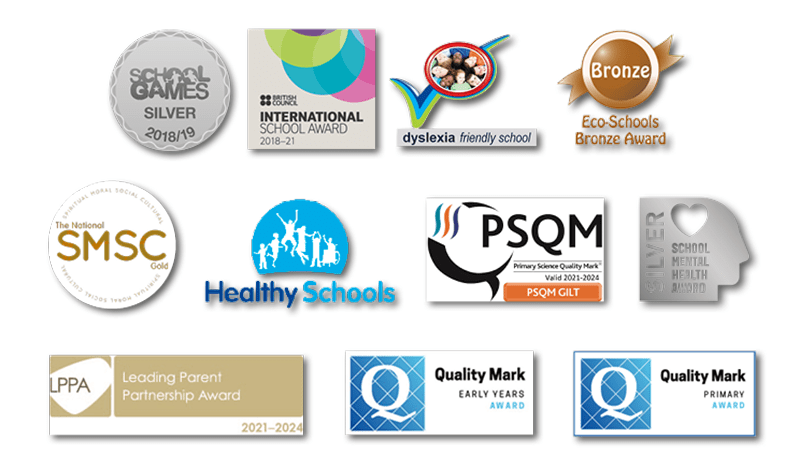Early Years Quality Mark
The Quality Mark for schools was developed in 1996, and updated in 2007, to provide a framework that would promote, support and celebrate the improvement of literacy, language and mathematics, sometimes also referred to as ‘basic’ or ‘functional’ skills.
The Quality Mark is an inclusive award and this version of the guidance will help all types and sizes of early years providers achieve accreditation. It was developed in 2008, following a national pilot funded by the Quality Improvement Agency (QIA) and undertaken with local authority advisers and early years practitioners representing maintained, private, voluntary and independent providers, to make the award achievable by settings catering for babies, toddlers and young children from birth up to age 5.
It provides a framework for self-evaluation and continuous improvement of the skills, particularly in communication, language and mathematical development, of young children through activities suitable for the stage of development they have reached.
Primary Quality Mark Award
A nationally recognised accreditation for school and the community, demonstrating a school’s commitment to continually improving standards.
Tribal’s Quality Mark Primary award supports and recognises improving standards in the provision, practice and performance of English and mathematics.
It aligns with national agendas and international views of best practice, supporting your inspection preparations and providing evidence of high-quality self-evaluation.
A school will achieve the award when you demonstrate that the criteria for all 10 elements are met and can provide evidence that participation in the award has had a positive impact on your provision and practice.
- A whole school strategy and planning to improve performance in English and mathematics
- An analysis of the assessment of pupil performance in English and mathematics
- Target setting for the improvement of performance in English and mathematics
- English and mathematics planning and intervention for all groups of pupils
- Review of progress made by all groups of pupils in English and mathematics
- A commitment to improving the skills of staff in the application of English and mathematics in the school
- The use of a range of teaching approaches and learning styles to improve English and mathematics
- The use of appropriate teaching and learning resources to improve English and mathematics
- The involvement of parents and carers in developing their child’s English and mathematics
- An effective procedure for monitoring planning and assessing performance in English and mathematics
International School Award
The International School Award is a British Council accreditation scheme rewarding schools with a notable global element in their curriculum. There are three entry points for schools: Foundation, Intermediate, and Accreditation.
The scheme began in 1999 and since then, over 1000 International School Awards have been granted.
Reaccreditation per school is required every three years
Leading Parent Partnership Award
If you have any questions or concerns please discuss these with a member of our Parent Parentnership team- Mrs. Aspinall, Mrs. Prince and Mrs. MCDonald.
The Leading Parent Partnership Award gives schools a coherent framework to deliver effective parental engagement from early years to post-16.
Through this award, schools can meet a number of longer term success criteria, such as improved pupil progress, punctuality, attendance and behaviour and increased parental involvement in school life.
Using the evidence portfolio, leaders can easily demonstrate, to Ofsted inspectors and other stakeholders, that the school has an outstanding and sustainable programme for parental engagement.
Dyslexia Friendly School
The philosophy underpinning the Quality Mark is that changing practice to accommodate dyslexic individuals often results in good practice for everyone.
In the case of educational institutions, the British Dyslexia Association recognises that the majority of moderately dyslexic students will be taught in mainstream classrooms and by non-specialist tutors. Therefore it is important that, as well as employing appropriate teaching methods, all environments are dyslexia friendly.
The Dyslexia Aware Consortium (DAC) is a large group of Local Authorities in the North West of England and Birmingham which offers schools the opportunity to work towards the Dyslexia Aware Quality Mark. (DAQM) This Quality Mark recognizes excellent inclusive practice in meeting the needs of Dyslexic students in the classroom.
School Primary Science Quality Mark – Awarded Gilt Level
In May 2021 334 Primary Science Quality Marks have been awarded to infant, junior, primary, middle and special schools to celebrate their commitment to excellence in science teaching and learning. So far, since its national launch in 2010, over 4000 schools across the UK have achieved a prestigious Primary Science Quality Mark.
The Primary School Quality Mark programme ensures effective leadership of science, enables schools to work together to share good practice and is supported by professional development led by local experts. It encourages teacher autonomy and innovation while at the same time offering a clear framework for development in science subject leadership, teaching and learning. Schools that achieve PSQM demonstrate commitment and expertise in science leadership, teaching and learning.
The Primary Science Quality Mark is led by the University of Hertfordshire, School of Education in collaboration with the Primary Science Teaching Trust.
Associate Professor Jane Turner, PSQM National Director said: “There was never a more important time for primary children to have a high-quality science education. The Coronavirus Pandemic has made everyone aware of the impact of science on our daily lives. Primary schools have an important role to ensure that children understand how science works and keeps us healthy and safe. Schools that have achieved a Primary Science Quality Mark have demonstrated a significant commitment to science teaching and learning, even at this challenging time for schools. The profile and quality of science in each awarded school is very high. Children are engaging with great science both in and outside the classroom, developing positive attitudes towards science as well as secure scientific understanding and skills. Science subject leaders, their colleagues, head teachers, children, parents and governors should be very proud.”
School Mental Health Award – Awarded Silver Level
The Department for Education recognises the direct link between positive mental health in schools and successful educational outcomes; the Mental Health Award for Schools builds on this link and provides a framework for educational institutions to evidence policies and initiatives that work towards improving emotional health and wellbeing for both staff and pupils.
The award ensures schools are using evidence-based approaches that align to professional and government guidelines. Utilising a developmental framework, which allows schools to evaluate current mental health practices, identify gaps, develop and strengthen these and work towards building an emotionally healthier environment. Through this process, schools commit to making mental health a strategic priority and developing a positive culture that promotes mental well-being for everyone.
“Supporting schools through the award is always a real privilege as it’s a vehicle for sustainable change with children right at its heart. Staff feel empowered by the process and take their whole school approach to mental health forwards in leaps and bounds; quickly but in ways that will be felt by the whole community over time.”
Dr Pooky Knightsmith


